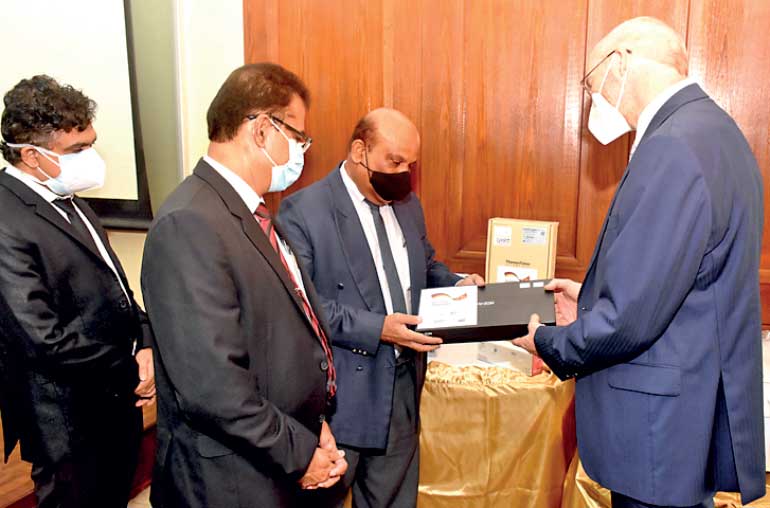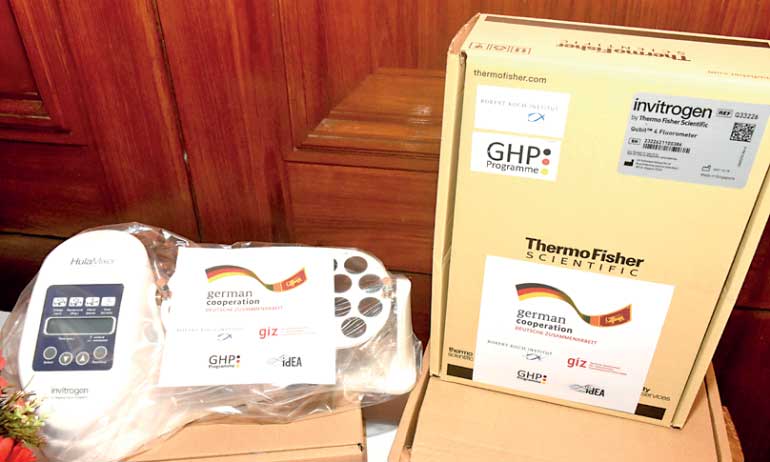Thursday Feb 19, 2026
Thursday Feb 19, 2026
Tuesday, 30 November 2021 01:50 - - {{hitsCtrl.values.hits}}



A team of the German Epidemic Preparedness Team (SEEG), funded by the German Federal Government, with experts from Robert Koch Institute (RKI) and Deutsche Gesellschaft für Internationale Zusammenarbeit (GIZ) has arrived in Sri Lanka to train laboratory staff. The mission focusses on increasing diagnostic capacity and expand the detection of virus variants enabling an efficient pandemic surveillance and control strategy in Sri Lanka.
“The pandemic can only be overcome if it is brought under control all over the world. Germany thus opted early on to focus on finding joint responses in a spirit of solidarity to the pandemic that continues to rage worldwide. With contributions totalling 2.2 billion euro to date, Germany is currently the second-largest donor. While some is being used for diagnostic tools and medication to treat COVID-19, most of this support is going to the international vaccine platform COVAX. Germany will provide at least 175 million doses in total.
“However, Germany is helping with more than just vaccines. Germany has also made available 450 million euro for humanitarian assistance in the context of COVID-19 in order to help people in humanitarian emergencies. The engagement of the German Epidemic Preparedness Team (SEEG) is another significant contribution to the fight against COVID-19 in Sri Lanka. German and Sri Lankan partners will develop local capacities in corona diagnostics,” German Ambassador Holger Seubert said.
Speaking at the official ceremony held at Medical Research Institute (MRI) on 26 November, Ministry of Health Additional Secretary (Medical Services) Dr. Sunil De Alwis thanked the German Government for continuing its support to uplift the health sector in Sri Lanka. “I am looking forward to many more fruitful collaborations and regular exchanges with Germany that goes beyond the technological and medical fields such as HR development,” Dr. De Alwis said.
This SEEG effort complements existing RKI activities in Sri Lanka to leverage synergies and promote sustainability. Funded by the BMG’s Global Health Protection Programme (GHPP), RKI had already established a sequencing platform in the University in Colombo and is working closely with the national reference laboratory (Medical Research Institute, MRI). This time, nine German experts are on-site to facilitate various parallel activities in both institutions. The mission also helps enhancing the cooperation between the Ministry of Health and the University of Colombo for an effective use of existing resources. The mission is supported and coordinated by GIZ Sri Lanka.
University of Colombo Vice Chancellor Senior Professor Chandrika Wijeyaratne said, “The University of Colombo is delighted that the long term research based partnership between the Department of Zoology and Environment Sciences of the Faculty of Science and RKI has materialised into a pragmatic and purposeful forward planning in the field of diagnostics and highly skilled capacity building of laboratory personnel in the Ministry of Health, Sri Lanka. I am certain that our university’s academic and research base, so ably supplemented by RKI, can venture further forward to make Sri Lanka capable in dealing with novel pathogens in the future. We thank our counterparts at RKI and the people of Germany for their support and cooperation.”
SEEG was initiated in 2015 by the German Federal Ministry for Economic Cooperation and Development in cooperation with the German Federal Ministry of Health in response to the Ebola fever outbreak in West Africa. Since then SEEG conducted more than 40 missions in more than 20 countries, including missions during the Lassa and Ebola outbreaks.